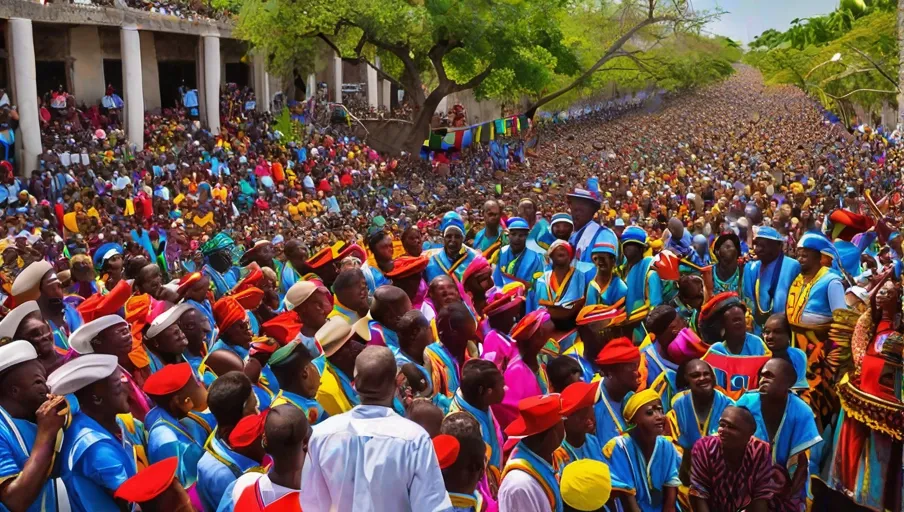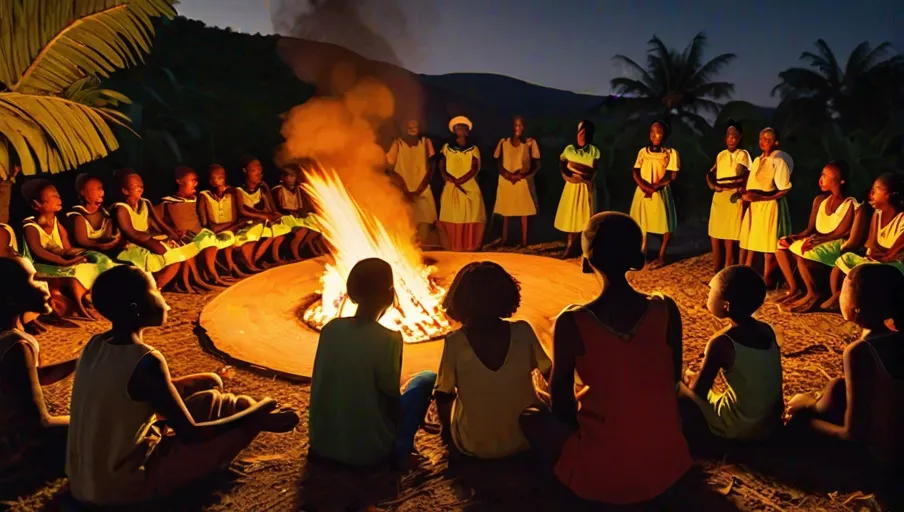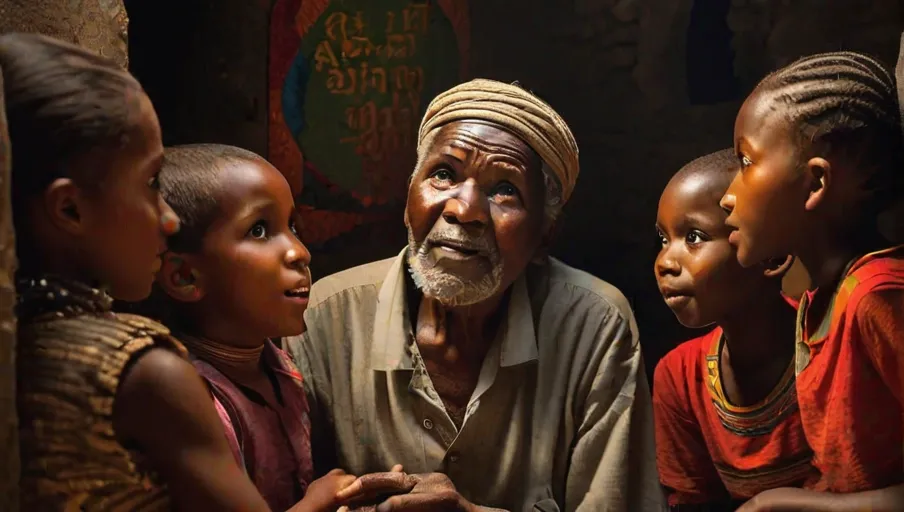
Discover the enchanting world of krik-krak, Haiti’s captivating storytelling tradition that continues to thrive.
Rooted in tire kont, an ancestral practice, krik-krak serves as a vessel for transmitting communal values, preserving the Creole language, and reflecting society.
Despite the challenges it faces, initiatives like the Kont Anba Tonèl festival and audio file archiving are ensuring its continuity.
Explore how this spellbinding art form connects us to Haiti’s rich cultural legacy and offers a profound connection to the power of storytelling.
- Krik-krak is an oral tradition in Haiti called tire kont, involving storytelling through short charades.
- Krik-krak reflects Haitian society and ways of life, preserving communal values and contributing to the preservation of Vodou.
- Kont Anba Tonèl is an annual storytelling festival that aims to keep the practice of krik-krak alive.
- The future of krik-krak relies on initiatives such as the festival, radio station archives, and the emergence of professional taletellers.

One cannot underestimate the cultural significance of krik-krak, as it reflects the ancestral heritage and communal values of Haitian society.
This unique storytelling tradition, known as tire kont, has its origins in Africa and has been passed down through generations in Haiti. Similar practices can also be found in other countries with African-descent populations.
Krik-krak not only entertains, but it also serves as a means of transmitting communal values, morality, and the Creole language. It is a practice that is deeply rooted in the lower-class and rural communities of Haiti, reflecting their ways of life.
The preservation of krik-krak is vital in preserving the cultural identity and heritage of these communities, as well as contributing to the vitality of the Creole language.

The practice of krik-krak, a communal storytelling tradition, plays a significant role in preserving Haitian cultural heritage and strengthening the Creole language.
This oral tradition, passed down from Haitian ancestors in Africa, reflects Haitian society and ways of life, particularly those of the lower class and rural communities.
Krik-krak not only transmits communal values and morality but also contributes to the preservation of Vodou, the most popular religion in Haiti.
However, the oral transmission of krik-krak poses a risk to the preservation of some rarely-told tales.
To address this, preservation efforts are being made, such as the annual Kont Anba Tonèl storytelling festival and the archiving of audio files of tales by radio stations.
While technology can play a role in preserving krik-krak, it is essential to strike a balance between oral transmission and documentation to ensure the continued vitality of this cultural tradition.

Kont Anba Tonèl, the annual storytelling festival in Haiti, celebrates the vibrant tradition of krik-krak and showcases the rich cultural heritage of the country.
This festival has become a significant platform for taletellers to share their stories and keep the practice of krik-krak alive.
In addition to preserving this oral tradition, the festival aims to revitalize krik-krak in urban communities, where it has been fading due to the influence of modern forms of entertainment. By bringing professional taletellers to these communities, the festival hopes to reignite interest and engagement in krik-krak.
Furthermore, the festival explores the impact of krik-krak on Haitian literature, as the practice has been an integral part of the oral tradition that informs Haitian storytelling and folklore. Through workshops and discussions, the festival encourages the exploration and integration of krik-krak in contemporary literary works, ensuring its continued relevance and influence.

Several cultural experts have hailed the profound impact of krik-krak on Haitian culture, recognizing its role in preserving the Creole language and transmitting communal values and morality.
Krik-krak, an oral tradition known as tire kont, is a unique treasure of Haitian culture that reflects and co-creates Haitian society. This communal practice keeps the Creole language alive and dynamic while also preserving the cultural identity and heritage of the lower-class and rural communities in Haiti.
However, there are challenges to the preservation of krik-krak. The oral transmission of Kont puts some rarely-told tales at risk of disappearing. Furthermore, the lack of documentation and archiving of audio files poses a threat to the practice.
Despite these challenges, krik-krak has a significant societal impact in Haiti, contributing to the preservation of the Creole language and the transmission of communal values and morality.

Many linguists recognize the significant role of krik-krak in preserving and revitalizing the Creole language through its communal practice. Krik-krak, an oral tradition in Haiti, serves as a powerful tool for preserving language diversity and maintaining the cultural heritage of the Haitian people. The impact of krik-krak extends beyond cultural preservation, as it also has implications for education.
- Preserving language diversity: Krik-krak serves as a means of keeping the Creole language alive and dynamic, providing a space for its continued usage and development.
- Impact on education: The practice of krik-krak contributes to language acquisition and fluency, promoting linguistic diversity in educational settings and fostering a sense of cultural pride among students.
Through the preservation of the Creole language and its impact on education, krik-krak plays a crucial role in empowering individuals and communities, ensuring that their voices and traditions are heard and celebrated.

The transmission of communal values in Haitian society is exemplified through the practice of krik-krak, which serves as a conduit for conveying moral lessons and cultural norms.
Krik-krak, a traditional storytelling tradition in Haiti, plays a crucial role in preserving the rich cultural heritage of the country. Through the art of krik-krak, stories are shared and passed down from generation to generation, promoting community engagement and strengthening the bonds within Haitian society.
These stories not only entertain but also teach valuable lessons, shaping the moral compass of individuals and fostering a sense of unity and identity.

Furthermore, the preservation of krik-krak in the oral tradition of Haiti is crucial for maintaining cultural heritage and fostering community engagement. This vibrant storytelling practice not only keeps the Creole language alive and dynamic but also transmits communal values and morality through tales and stories. To ensure the longevity of krik-krak, preservation methods and contemporary adaptations are being explored.
Some initiatives include:
- Digitization: Audio files of krik-krak tales are being archived by radio stations, allowing future generations to access and learn from this cultural treasure.
- Festivals: The annual Kont Anba Tonèl storytelling festival showcases Haitian modes of storytelling, bringing together professional taletellers and providing a platform for the practice to thrive.
- Workshops: Storytelling workshops are being organized to pass on the art of krik-krak to aspiring taletellers, encouraging a new generation to carry on the tradition.
- Documentation: Efforts are being made to document krik-krak tales and stories, ensuring their preservation and accessibility for future generations.
- Community involvement: Engaging the community in the practice of krik-krak through storytelling events and gatherings fosters a sense of cultural identity and pride, strengthening the bond between generations.

Occasionally, krik-krak serves as a powerful tool for preserving the cultural identity and rich heritage of Haiti. This vibrant storytelling tradition not only reflects Haitian society but also contributes to the preservation of the Creole language and communal values. However, there are challenges in revitalizing krik-krak in urban communities and documenting its stories.
Revitalizing krik-krak in urban communities requires creating spaces and platforms where the practice can thrive. This could involve organizing storytelling festivals, workshops, and events that engage both the older generation and the youth. By bringing krik-krak to urban areas, we can ensure its continuity and expansion beyond rural communities.
Documenting krik-krak stories poses a unique challenge due to their oral nature. The lack of written records makes it difficult to preserve and share these tales. However, there are efforts being made to address this issue. Some radio stations are archiving audio files of tales, and initiatives like the Kont Anba Tonèl festival provide a platform for professional taletellers to showcase their art.
Revitalizing krik-krak in urban communities and documenting its stories are crucial for preserving Haiti’s cultural identity and heritage. By embracing this tradition and finding innovative ways to share and pass it on, we can ensure that krik-krak continues to captivate and inspire future generations.
| Challenges in Revitalizing Krik-Krak | Challenges in Documenting Krik-Krak Stories |
|---|---|
| Lack of awareness and interest | Oral nature of krik-krak |
| Limited access to cultural spaces | Absence of written records |
| Shifting societal values | Risk of stories disappearing |
| Language barriers | Limited documentation efforts |
| Modernization and technology | Difficulty in archiving and preserving |

To ensure the future of krik-krak, it is imperative that efforts are made to address the challenges in revitalizing the practice in urban communities and documenting its stories. Krik-krak is a spellbinding storytelling tradition in Haiti that reflects the cultural identity and heritage of the Haitian people.
In order to preserve and promote this rich tradition, the following actions are crucial:
- Promoting youth involvement: Engaging young people in learning and practicing krik-krak will ensure its transmission to future generations.
- Documentation and archiving: Creating comprehensive archives of krik-krak stories and performances will safeguard this oral tradition from being lost over time.
- Increasing accessibility: Making krik-krak festivals, workshops, and resources easily accessible to the wider public will generate interest and participation.
- Collaboration with educational institutions: Partnering with schools and universities to include krik-krak in their curricula will integrate this tradition into formal education.
- Encouraging community support: Engaging local communities to value and support krik-krak will create a sustainable environment for its continuation.

One of the major challenges facing the preservation of krik-krak is the lack of documentation, which puts at risk the rare and valuable tales that are part of this oral tradition.
Krik-krak is a unique storytelling tradition in Haiti that relies on oral transmission to pass down tales, riddles, and communal values. The oral nature of krik-krak is crucial in keeping the Creole language alive and dynamic, as well as preserving the cultural identity and heritage of the lower class and rural communities in Haiti.
However, the absence of written documentation makes it difficult to safeguard these stories for future generations.
Technology can play a crucial role in addressing this challenge by providing tools for recording and archiving krik-krak performances. By embracing digital platforms and audiovisual recording techniques, we can ensure the preservation of krik-krak and its invaluable contribution to Haitian culture.



